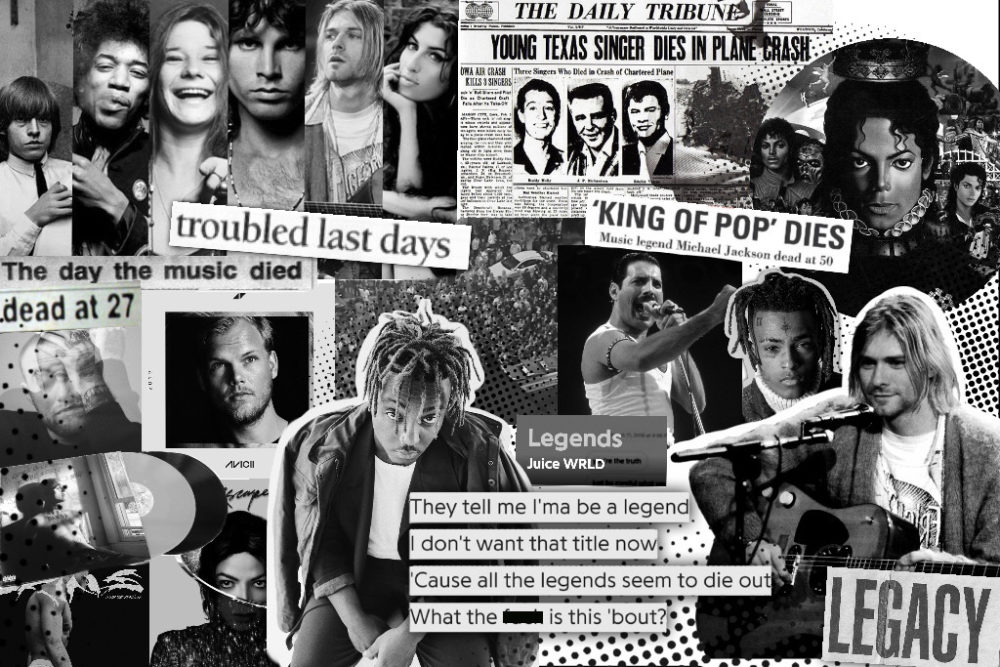
By Hien Bui
Each generation has its own collection of artists that passed away unexpectedly.
The premature demises of these stars capture hearts and imaginations regardless of what age they were or whether they were taken at the rise or pinnacle of their careers.
So how exactly does untimely death become a part of or, in some cases, even overshadow an artist’s living legacy?
Dying young
When anyone dies young, there’s a sense of what could have been. We just have to ask the questions. What would life have been like for their loved ones left behind? What could they have contributed to the world if they had been given more time? What kind of life could they have led if their lifelines weren’t cut so abruptly short?
From the rising stars who perished on The Day The Music Died in 1959 to the passing of rapper Juice WRLD last December, the tragedy of a talented light snuffed out ahead of its time isn’t new or groundbreaking. However, that doesn’t stop the public fascination.
When celebrities die young, it’s a similar matter except there’s also this layer of disbelief to how someone who had it all—the youth, the money, the fame—could be gone before their lives really had a chance to begin.
We wonder about what they could have done with more time. We pity that they and the world never get to find out the answer.
One example of such a star dimmed before it could reach its full potential is Ritchie Valens’ passing during a 1959 plane crash that took the lives of all passengers on board (later dubbed “The Day The Music Died”). Valens, who was 17, was coming off of the explosive popularity of his song “La Bamba”. His discography became synonymous with his untimely death as remembrance interchangeably linked the tragic accident with his national success.
Valens belongs to the “27 Club”, the infamous moniker given to the list of celebrities who continue an unfortunate pattern of celebrities not making it to or past the age of 27. Membership of this exclusive “club” creates an enduring sense of remembrance and tragedy.
In dying young, death makes itself a part of a person’s legacy. Their lives and their artistry become synonymous with their lost potential and all the burgeoning questions about what if they had lived, keeping an enduring (if not, tragic) legacy.
The celebrity connection
While the famous circles of society lead lives we can only dream of, we still connect with these people. Maybe their voices are on our playlists or their faces connected to our favorite shows and movies. Maybe we just know their name but, regardless, we develop a sense of familiarity with these people.
Fame is a double-edged sword. Having everything you could ever want sounds great but obviously isn’t without its own pitfalls and dark side. Being surrounded by excess might beat the drudgery of working a 9 to 5 job, but it leaves less incentive to want to grow old and lose or leave the lifestyle. With all the vices money can buy and their dreams accomplished, sometimes it seems like stars are doomed, caged by their own privileges.
Members of the 27 Club died from issues with substance abuse, suicide, or in mysterious circumstances. Membership is exclusive — you have to be famous and die before the titular age — but in a way that invokes nothing but a hollow sense of pity.
It’s these dualities of success that keep celebrities untouchable while still making them easy to sympathize with and, when a celebrity dies, suddenly, there’s a sucker-punch to remind us that stars are completely human.
It’s hard to wrap your head around someone just not existing anymore even if you’ve never met or seen them yourself. We feel their loss even if we didn’t know them personally. We want to remember these people.
The power of remembrance
The remembrance machine has become a behemoth in its own right.
When a celebrity dies, nostalgia tinges their artistry in new hues as the promise of new work is no longer there. We buy up posthumous albums, unreleased snippets, or other postmortem works of these late artists. Outpourings of love and recountings of personal experiences surge to the forefront of the narrative because, well, it’s hard to hate or criticize somebody when they’re no longer alive to defend themselves.
Late rapper XXXTentacion made Spotify history following his untimely passing with his streaming numbers rising to 549%; the aforementioned Juice WRLD also saw a similar jump in streaming numbers; following Michael Jackson’s death, the King of Pop’s posthumous albums sold hundreds of millions of copies nationwide.
It’s a sad case of not knowing what we had until it’s gone.
Media headlines used to slander the same celebrities suddenly eulogize them for the run of the news cycle. People are placed on pedestals. The words “legend” or “icon” are thrown around.
While this behavior may feel gimmicky or “too little, too late”, it serves as a last “thank you” to the artists who seemed to pass before their time whether it’s genuine or not by creating a legacy that could live on in the artists’ stead.
Where death may end a life, legacy makes sure it lives on forever.





